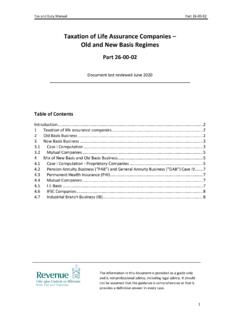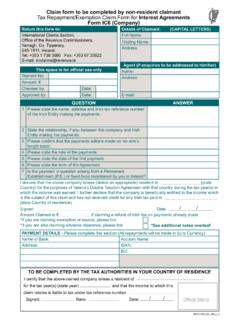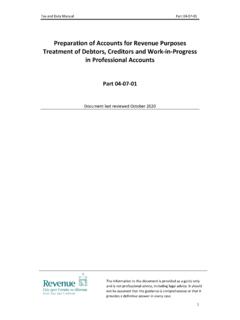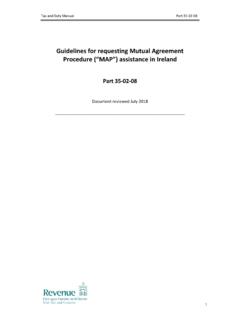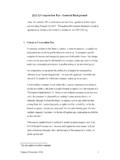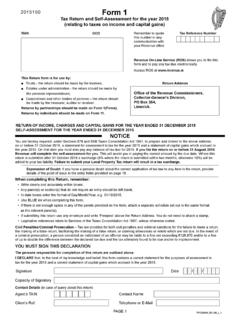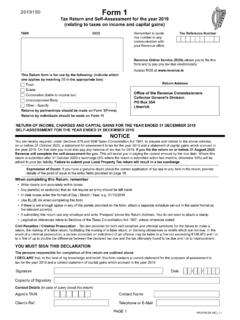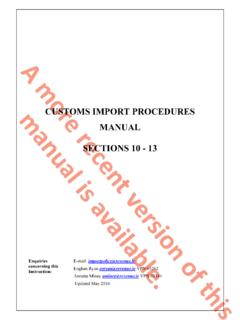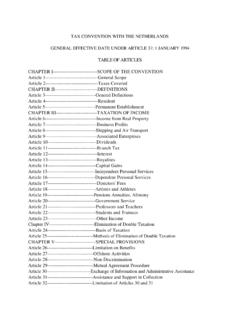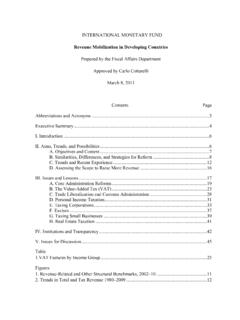Transcription of Double taxation treaty between Ireland and the United …
1 CONVENTION between THE GOVERNMENT OF Ireland AND THE GOVERNMENT OF THE United KINGDOM FOR THE AVOIDANCE OF Double taxation AND THE PREVENTION OF FISCAL EVASION WITH RESPECT TO TAXES ON INCOME AND CAPITAL GAINS The Government of Ireland and the Government of the United Kingdom; Desiring to conclude a Convention for the avoidance of Double taxation and the prevention of fiscal evasion with respect to taxes on income and capital gains; Have agreed as follows: ARTICLE 1 Personal scope This Convention shall apply to persons who are residents of one or both of the Contracting States. ARTICLE 2 Taxes covered (1) The taxes which are the subject of this Convention are: ( a ) in Ireland : (i) the income tax; (ii) the corporation profits tax; (iii) the corporation tax; and (iv) the capital gains tax; ( b ) in the United Kingdom: (i) the income tax; (ii) the corporation tax; (iii) the petroleum revenue tax; and (iv) the capital gains tax.
2 (2) This Convention shall also apply to any identical or substantially similar taxes which are imposed by either Contracting State after the date of signature of this Convention in addition to, or in place of, the existing taxes. ARTICLE 3 General definitions (1) In this Convention, unless the context otherwise requires: (a) the term " Ireland " includes any area outside the territorial waters of Ireland which in accordance with international law has been or may hereafter be designated, under the laws of Ireland concerning the Continental Shelf, as an area within which the rights of Ireland with respect to the sea bed and sub-soil and their natural resources may be exercised; (b) the term " United Kingdom" includes any area outside the territorial sea of the United Kingdom which in accordance with international law has been or may hereafter be designated, under the laws of the United Kingdom concerning the Continental Shelf, as an area within which the rights of the United Kingdom with respect to the sea bed and sub-soil and their natural resources may be exercised; (c) the term "nationals" means: (i) in relation to Ireland , all citizens of Ireland and all legal persons, associations or other entities deriving their status as such from the laws in force in Ireland .
3 (ii) in relation to the United Kingdom, citizens of the United Kingdom and Colonies, British subjects under Section 2 of the British Nationality Act 1948 whose notices given under that Section have been acknowledged before the date of signature of this Convention, British subjects by virtue of Section 13 (1)or Section 16 of the British Nationality Act 1948 or Section 1 of the British Nationality Act 1965, and British protected persons within the meaning of the British Nationality Act 1948; and all legal persons, associations or other entities deriving their status as such from the law in force in the United Kingdom; (d) the term "Irish tax" means tax imposed by Ireland being tax to which this Convention applies by virtue of the provisions of Article 2; the term " United Kingdom tax" means tax imposed by the United Kingdom being tax to which this Convention applies by virtue of the provisions of Article 2; (e) the term "tax" means Irish tax or United Kingdom tax, as the context requires; (f) the terms "a Contracting State" and "the other Contracting State" mean Ireland or the United Kingdom, as the context requires; (g) the term "person" comprises an individual, a company and any other body of persons; (h) the term "company" means any body corporate or any entity which is treated as a body corporate for tax purposes.
4 (i) the terms "enterprise of a Contracting State" and "enterprise of the other Contracting State" mean respectively an enterprise carried on by a resident of a Contracting State and an enterprise carried on by a resident of the other Contracting State; (j) the term "competent authority" means, in the case of Ireland , the Revenue Commissioners or their authorised representative, and in the case of the United Kingdom, the Commissioners of Inland Revenue or their authorised representative. (2) As regards the application of this Convention by a Contracting State any term not otherwise defined shall, unless the context otherwise requires, have the meaning which it has under the laws of that Contracting State relating to the taxes which are the subject of this Convention.
5 ARTICLE 4 Fiscal domicile (1) For the purposes of this Convention, the term "resident of a Contracting State" means, subject to the provisions of paragraphs (2) and (3) of this Article, any person who, under the law of that State, is liable to taxation therein by reason of his domicile, residence, place of management or any other criterion of a similar nature; the term does not include any individual who is liable to tax in that Contracting State only if he derives income from sources therein. The terms "resident of Ireland " and "resident of the United Kingdom" shall be construed accordingly. (2) Where by reason of the provisions of paragraph (1) of this Article an individual is a resident of both Contracting States, then his status shall be determined in accordance with the following rules: (a) he shall be deemed to be a resident of the Contracting State in which he has a permanent home available to him.
6 If he has a permanent home available to him in both Contracting States, he shall be deemed to be a resident of the Contracting State with which his personal and economic relations are closer (centre of vital interests); (b) if the Contracting State in which he has his centre of vital interests cannot be determined, or if he has not a permanent home available to him in either Contracting State, he shall be deemed to be a resident of the Contracting State in which he has an habitual abode; (c) if he has an habitual abode in both Contracting States or in neither of them, he shall be deemed to be a resident of the Contracting State of which he is a national; (d) if he is a national of both Contracting States or of neither of them, the competent authorities of the Contracting States shall settle the question by mutual agreement.
7 (3) Where by reason of the provisions of paragraph (1) of this Article a person other than an individual is a resident of both Contracting States, then it shall be deemed to be a resident of the Contracting State in which its place of effective management is situated. ARTICLE 5 Permanent establishment (1) For the purposes of this Convention, the term "permanent establishment" means a fixed place of business in which the business of the enterprise is wholly or partly carried on. (2) The term "permanent establishment" shall include especially: (a) a place of management; (b) a branch; (c) an office; (d) a factory; (e) a workshop; (f) a mine, oil well, quarry or other place of extraction of natural resources; (g) an installation or structure used for the exploration of natural resources.
8 (3) The term "permanent establishment" shall not be deemed to include: (a) the use of facilities solely for the purpose of storage, display or delivery of goods or merchandise belonging to the enterprise; (b) the maintenance of a stock of goods or merchandise belonging to the enterprise solely for the purpose of storage, display or delivery; (c) the maintenance of a stock of goods or merchandise belonging to the enterprise solely for the purpose of processing by another enterprise; (d) the maintenance of a fixed place of business solely for the purpose of purchasing goods or merchandise, or for collecting information, for the enterprise; (e) the maintenance of a fixed place of business solely for the purpose of advertising, for the supply of information, for scientific research or for similar activities which have a preparatory or auxiliary character, for the enterprise.
9 (4) A person acting in a Contracting State on behalf of an enterprise of the other Contracting State other than an agent of independent status to whom the provisions of paragraph (6) of this Article apply shall be deemed to be a permanent establishment in the first-mentioned State if he has, and habitually exercises in that State, an authority to conclude contracts in the name of the enterprise, unless his activities are limited to the purchase of goods or merchandise for the enterprise. (5) A person carrying on activities in connection with the exploration or exploitation of the sea bed and sub-soil and their natural resources situated in a Contracting State shall be deemed to be carrying on a trade through a permanent establishment in that Contracting State.
10 (6) An enterprise of a Contracting State shall not be deemed to have a permanent establishment in the other Contracting State merely because it carries on business in that other State through a broker, general commission agent or any other agent of an independent status, where such persons are acting in the ordinary course of their business. (7) The fact that a company which is a resident of a Contracting State controls or is controlled by a company which is a resident of the other Contracting State, or which carries on business in that other State (whether through a permanent establishment or otherwise), shall not of itself constitute either company a permanent establishment of the other. ARTICLE 6 Limitation of relief Where under any provision of this Convention income is relieved from tax in a Contracting State and, under the law in force in the other Contracting State, an individual, in respect of the said income, is subject to tax by reference to the amount thereof which is remitted to or received in that other Contracting State, and not by reference to the full amount thereof, then the relief to be allowed under this Convention in the first-mentioned Contracting State shall apply only to so much of the income as is remitted to or received in that other Contracting State.
